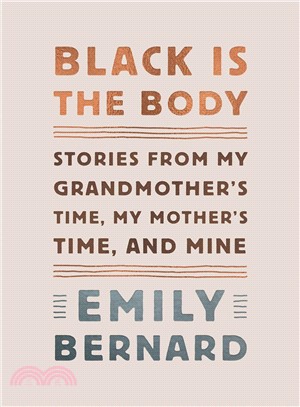Black Is the Body ― Stories from My Grandmother's Time, My Mother's Time, and Mine
商品資訊
ISBN13:9780451493026
出版社:Alfred a Knopf Inc
作者:Emily Bernard
出版日:2019/01/29
裝訂/頁數:精裝/192頁
規格:20.3cm*12.7cm*2.5cm (高/寬/厚)
商品簡介
作者簡介
相關商品
商品簡介
An extraordinary, exquisitely written memoir (of sorts) that looks at race--in a fearless, penetrating, honest, true way--in twelve telltale, connected, deeply personal essays that explore, up-close, the complexities and paradoxes, the haunting memories and ambushing realities of growing up black in the South with a family name inherited from a white man, of getting a PhD from Yale, of marrying a white man from the North, of adopting two babies from Ethiopia, of teaching at a white college and living in America's New England today. From the acclaimed editor of Remember Me to Harlem: The Letters of Langston Hughes and Carl Van Vechten ("Superb," Arnold Rampersad; "A major contribution," Henry Louis Gates; "Magnificent," Washington Post).
"I am black--and brown, too," writes Emily Bernard. "Brown is the body I was born into. Black is the body of the stories I tell."
And the storytelling, and the mystery of Bernard's storytelling, of getting to the truth, begins with a stabbing in the gut in a coffee shop in a New England college town. Bernard writes how, when she was a graduate student at Yale, she walked into Koffee? on Audubon Street in New Haven, and, along with six other people, was randomly attacked by a stranger with a knife ("I remember making the decision not to let the oddness of this stranger bother me"). "I was not stabbed because I was black," she writes (the attacker was white), "but I have always viewed the violence I survived as a metaphor for the violent encounter that has generally characterized American race relations. There was no connection between us, yet we were suddenly and irreparably bound by a knife, an attachment that cost us both: him, his freedom; me, my wholeness."
Bernard explores how that bizarre act of violence set her free and unleashed the storyteller in her ("The equation of writing and regeneration is fundamental to black American experience").
She writes in Black Is the Body how each of the essays goes beyond a narrative of black innocence and white guilt, how each is anchored in a mystery, and how each sets out to discover a new way of telling the truth as the author has lived it. "Blackness is an art, not a science. It is a paradox: intangible and visceral; a situation and a story. It is the thread that connects these essays, but its significance as an experience emerges randomly, unpredictably . . . Race is the story of my life, and therefore black is the body of this book."
And what most interests Bernard is looking at "blackness at its borders, where it meets whiteness in fear and hope, in anguish and love."
"I am black--and brown, too," writes Emily Bernard. "Brown is the body I was born into. Black is the body of the stories I tell."
And the storytelling, and the mystery of Bernard's storytelling, of getting to the truth, begins with a stabbing in the gut in a coffee shop in a New England college town. Bernard writes how, when she was a graduate student at Yale, she walked into Koffee? on Audubon Street in New Haven, and, along with six other people, was randomly attacked by a stranger with a knife ("I remember making the decision not to let the oddness of this stranger bother me"). "I was not stabbed because I was black," she writes (the attacker was white), "but I have always viewed the violence I survived as a metaphor for the violent encounter that has generally characterized American race relations. There was no connection between us, yet we were suddenly and irreparably bound by a knife, an attachment that cost us both: him, his freedom; me, my wholeness."
Bernard explores how that bizarre act of violence set her free and unleashed the storyteller in her ("The equation of writing and regeneration is fundamental to black American experience").
She writes in Black Is the Body how each of the essays goes beyond a narrative of black innocence and white guilt, how each is anchored in a mystery, and how each sets out to discover a new way of telling the truth as the author has lived it. "Blackness is an art, not a science. It is a paradox: intangible and visceral; a situation and a story. It is the thread that connects these essays, but its significance as an experience emerges randomly, unpredictably . . . Race is the story of my life, and therefore black is the body of this book."
And what most interests Bernard is looking at "blackness at its borders, where it meets whiteness in fear and hope, in anguish and love."
作者簡介
EMILY BERNARD was born and grew up in Nashville, Tennessee, and received her PhD in American studies from Yale University. She has been the recipient of grants from the Ford Foundation, the NEH, and a W. E. B. Du Bois Resident Fellowship at Harvard University. Her essays have been published in journals and anthologies, among them The American Scholar, Best American Essays, and Best African American Essays. She is a Professor of English and Critical Race and Ethnic Studies at the University of Vermont.
主題書展
更多
主題書展
更多書展今日66折
您曾經瀏覽過的商品
購物須知
外文書商品之書封,為出版社提供之樣本。實際出貨商品,以出版社所提供之現有版本為主。部份書籍,因出版社供應狀況特殊,匯率將依實際狀況做調整。
無庫存之商品,在您完成訂單程序之後,將以空運的方式為你下單調貨。為了縮短等待的時間,建議您將外文書與其他商品分開下單,以獲得最快的取貨速度,平均調貨時間為1~2個月。
為了保護您的權益,「三民網路書店」提供會員七日商品鑑賞期(收到商品為起始日)。
若要辦理退貨,請在商品鑑賞期內寄回,且商品必須是全新狀態與完整包裝(商品、附件、發票、隨貨贈品等)否則恕不接受退貨。
























